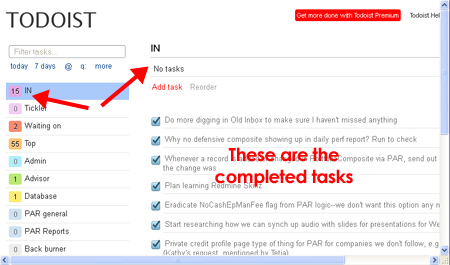FINAL UPDATE: Todoist is back up: time to immediately save my data!
UPDATE: Todoist tweeted and posted about the problem at 1:35 EST: see http://todoist.com/Support/showQuestion/255/ . They say that their database became corrupted for unknown reasons and that they’re fixing the problem. They also apologized for the outage. I’m no longer worried about having to switch systems, but will take my own advice (below) and start backing up.
In my post “Why Organization Improves Motivation, and Some Organization Tips” from a couple of years back I extol the virtues of Todoist, a free online task tracking system with a modestly upgraded, slightly less free version available as well. Today I’m not so much in an extolling mood. I can open Todoist, and each of the categories shows the proper number next to it showing how many tasks I have in that category, but clicking on the categories themselves opens up a screen with no tasks except for (bizarrely) the completed ones.

I have a work account and a personal account for Todoist, and I’ve tried them both, on different computers and browsers, with the same results, making me think it’s a universal problem. ToDoist Mobile on my smartphone is giving me even more flack, claiming I have no projects (categories) at all.
To my surprise, Google reports that no one has blogged about this, and there appear to be no news articles on the subject. If you’re experiencing this problem, though, I’m here to tell you it’s not just you.
Oh, and did I mention that their support site times out? I can’t even ask what’s going on.
I understand it’s a free service, but it’s still very damaging to have a large amount of critical information disappear on you and to not know whether or when you might ever get it back. Being able to access Todoist on my phone as well as on computers wherever I may be has been terrific, but going forward I may give that up just to get some peace of mind that I won’t lose it all. Losing my task list would set me back enormously and cause problems in many areas of my life.
The moral? Back up your data. In my case, it would have been smart to get into the habit of at least once a week (and preferably more often) entering “view all” in the search box on todoist and saving the resulting page, which lists all current tasks in all categories, but I’ve tended to think of backup as only applying to data on devices I own–bad mistake. If my data does reappear, I’ll certainly get in the habit of doing this. If you’re not in my position, may I please very strongly recommend regularly backing up your task list (and calendar, for that matter)?
And if you are on Todoist, like me, could you comment on whether you’re experiencing the same thing today (Thursday, July 28th) or not?
Update: I should have thought to check the Twitterverse; when I did, I found others experiencing the same problem. Not long ago, @JB66 reported “It’s still mostly down, but if you view Completed Tasks it shows your current tasks as well buried in there.”
Like this:
Like Loading...




 To see what I have to say about talent, read my posts “
To see what I have to say about talent, read my posts “

